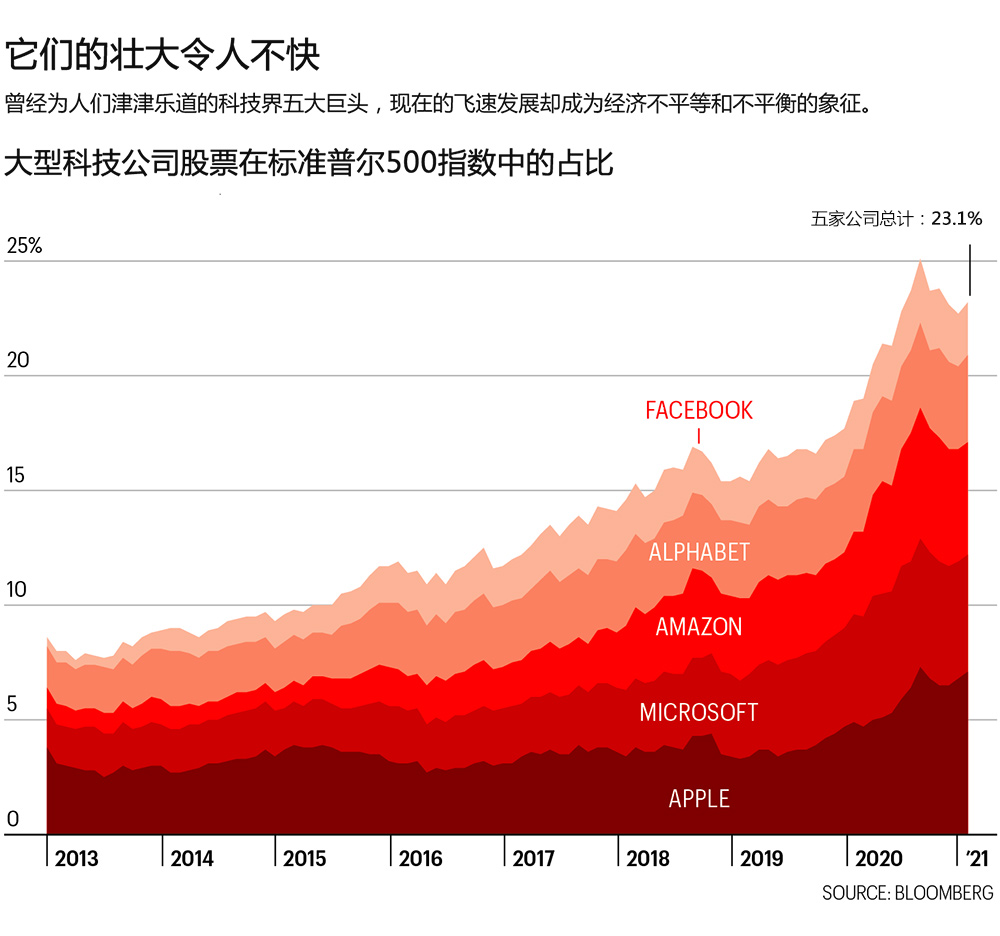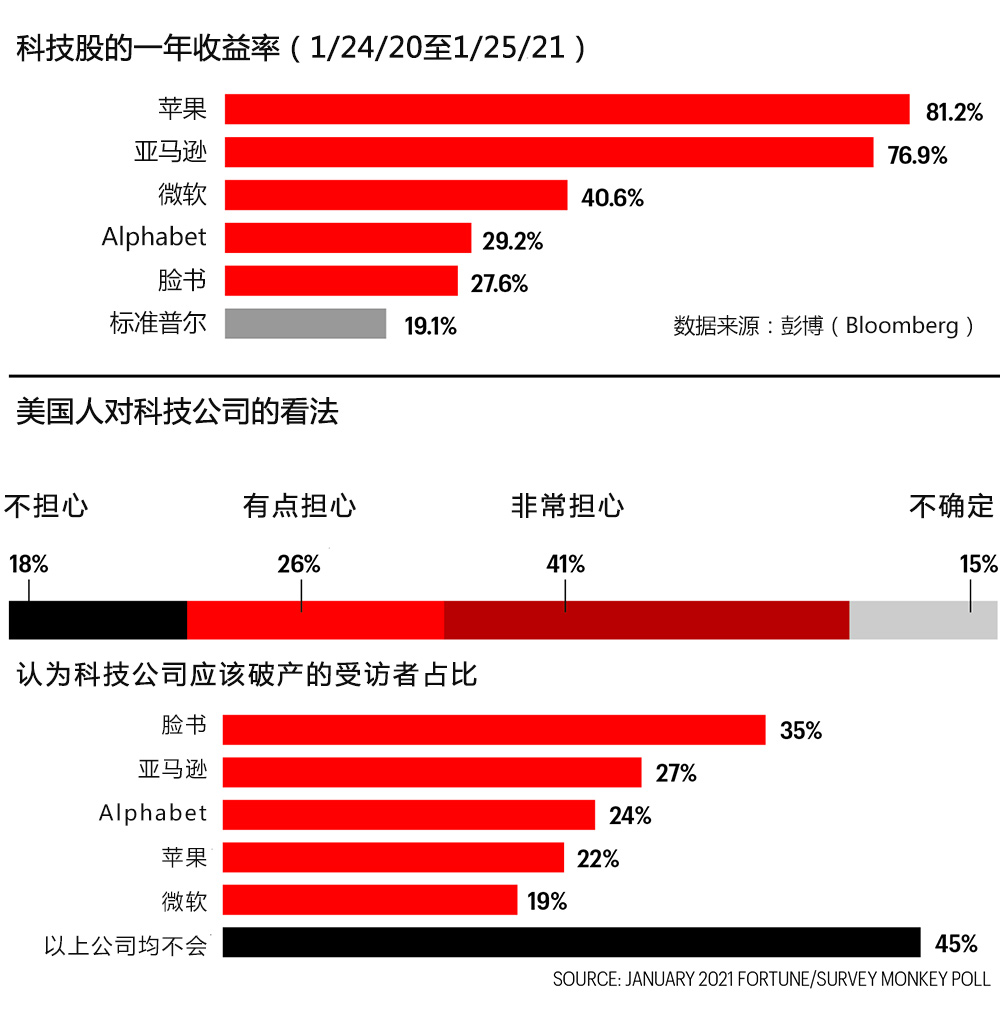
這個詞你大概已經(jīng)聽過一萬遍了。它肯定經(jīng)常出現(xiàn)在你的收件箱里。而且,很可能你自己也不止一次地說過“新常態(tài)”。
當(dāng)然,這個詞上口又好記。而且,過去的一年不同尋常,充滿了動蕩與犧牲,還有許多人被迫隔離。在這樣的經(jīng)歷下,這個詞觸動了每一個人都能感同身受的錯位感。但新常態(tài)到底意味著什么呢?
“我們討論新常態(tài)時幾乎帶著宗教般的狂熱。”管理咨詢公司今日未來研究所(Future Today Institute)的創(chuàng)始人兼首席執(zhí)行官艾米?韋伯說,“我好奇了好一陣子:到底是什么在驅(qū)使我們尋找新常態(tài)的答案?我認(rèn)為答案不是人們想知道未來的樣子,從而能為未來做計劃。相反,我認(rèn)為,我們之所以迫切地想要了解新常態(tài),其實是大家都希望未來不再發(fā)生這么大的變化。”
經(jīng)歷了過去一年的動蕩不安,心理上想讓變化慢下來、希望未來能更正常,這是一種完全可以理解的反應(yīng)。當(dāng)然,最大的變數(shù)是新冠病毒,全球已有約1億人感染,210多萬人因此喪生。新冠肺炎疫情給經(jīng)濟(jì)帶來了巨大損失,但它也加快了新技術(shù)的發(fā)展,改變了我們的工作和生活方式,帶來了難以預(yù)測長期走向的變量。
盡管我們可能想按下“暫停”鍵,但現(xiàn)實中并沒有這個選項。現(xiàn)在比以往任何時候都更迫切需要了解接下來會發(fā)生什么,商業(yè)、經(jīng)濟(jì)和共同抗擊新冠肺炎的戰(zhàn)斗將何去何從。個中關(guān)鍵或許在于要弄清楚:經(jīng)歷了12個月的動蕩后,現(xiàn)在有些事情將永遠(yuǎn)地“新”下去,有些事情仍然是“常態(tài)”,而難的是認(rèn)識到哪些是哪些并找到正確應(yīng)對之道。
舉個例子,看看喬?拜登總統(tǒng)的當(dāng)選就知道了。他一生都是中間派,一個有自我認(rèn)知的傳統(tǒng)政客,連他的口罩上可能都會印上“常態(tài)”的字樣。但是,民主黨至少在未來兩年將對國會參眾兩院擁有微弱的領(lǐng)先優(yōu)勢,這無疑是“新”的:這種權(quán)力的變動將影響華爾街、全球貿(mào)易和中美關(guān)系。而這個結(jié)果出現(xiàn)在當(dāng)代最具爭議的選舉之后——離任的總統(tǒng)傳播錯誤信息,孤注一擲地試圖扭轉(zhuǎn)他的絕對敗選,無疑增加了我們對“新”時刻的焦慮。
對伊恩?布雷默的客戶來說,華盛頓重啟絕對是頭等大事。他是政治風(fēng)險咨詢公司歐亞集團(tuán)(Eurasia Group)的創(chuàng)始人兼總裁,他的每個客戶都想知道,“拜登有什么不同?他有多少控制權(quán)?美國真的面臨比我們想象中更嚴(yán)重的結(jié)構(gòu)性風(fēng)險嗎?”
華爾街似乎認(rèn)為,在拜登的領(lǐng)導(dǎo)下,生活將最大限度地恢復(fù)“常態(tài)”。從大選日到拜登1月20日就職,標(biāo)準(zhǔn)普爾500指數(shù)上漲了14.3%。算起來,拜登對股市的提振力度是四年前特朗普的兩倍多,當(dāng)時標(biāo)普500指數(shù)同期上漲6.2%。目前看來,市場似乎對繁重的新監(jiān)管規(guī)定或加稅政策不以為然。與此同時,好像各大銀行都在競相發(fā)布最樂觀的國內(nèi)生產(chǎn)總值預(yù)測:摩根大通(JPMorgan Chase)預(yù)測,2021年美國經(jīng)濟(jì)將增長5.8%。摩根士丹利(Morgan Stanley)的預(yù)測是6.4%。高盛是6.6%。人們相信存在大量被壓抑的需求,消費者行為會“報復(fù)性”地恢復(fù)“常態(tài)”。
當(dāng)然,信心在很大程度上來自于新冠肺炎疫苗的快速上市,新冠疫苗效果喜人,采用了“新”的研發(fā)方式,速度也史無前例。(想了解輝瑞與BioNTech合作成功研發(fā)疫苗的故事,請參閱本期的“對話”欄目。)盡管一開始的疫苗接種工作不盡人意,現(xiàn)在美國的疫苗接種速度正在加快,盡管同時病毒已經(jīng)發(fā)生了變異,變得更具傳染性。最初拜登總統(tǒng)宣布要在上任100天內(nèi)接種1億劑疫苗,到1月底,他承諾,到夏末,美國將擁有足夠3億人使用的疫苗。
在國際關(guān)系中,新常態(tài)可能與舊常態(tài)相似。拜登政府將迅速采取行動,緩和與關(guān)鍵盟友之間的緊張關(guān)系。在貿(mào)易談判中,白宮也將重拾不那么具有破壞性的外交風(fēng)格,重樹全球主義思維,這意味著企業(yè)喜聞樂見的可預(yù)測性。
但挑戰(zhàn)仍然嚴(yán)峻:疫情的加重突出了美國的收入不平等問題。疫情也進(jìn)一步破壞了商業(yè)生態(tài)系統(tǒng),成千上萬的小企業(yè)倒閉了,而隨著我們對科技巨頭的依賴加深,部分大企業(yè)飛速崛起。


我們在疫情中狼狽前行時,科技公司是我們的救星。在封鎖期間,得益于科技公司,我們可以用Zoom開視頻工作會、刷劇、在網(wǎng)上買衣服、在隔離中保持社交互動。但對很多人來說,這種“新”情況并不屬于“常態(tài)”。監(jiān)管機(jī)構(gòu)、兩黨當(dāng)選官員以及消費者都對大型科技公司的影響力感到些許不安。今年1月,《財富》雜志和SurveyMonkey聯(lián)合進(jìn)行的一項民調(diào)顯示,64%的美國成年人希望聯(lián)邦政府至少對一家大型科技公司進(jìn)行反壟斷調(diào)查。(谷歌和Facebook已經(jīng)在審查中。)
布雷默說,社交媒體公司在特朗普總統(tǒng)任期最后的黑暗時刻對他采取的禁言措施,給這場辯論增加了意想不到的變化。他說,在共和黨人眼中,科技監(jiān)管現(xiàn)在屬于黨派之爭。“不管到底喜不喜歡,科技公司突然全都和民主黨站在了一條戰(zhàn)線。”布雷默表示,“我不記得還有什么時候,美國經(jīng)濟(jì)中最重要的公司曾和一個政黨進(jìn)行過如此激烈的黨派斗爭。”這可能不是“常態(tài)”,但絕對是“新”情況。(財富中文網(wǎng))
譯者:Agatha
這個詞你大概已經(jīng)聽過一萬遍了。它肯定經(jīng)常出現(xiàn)在你的收件箱里。而且,很可能你自己也不止一次地說過“新常態(tài)”。
當(dāng)然,這個詞上口又好記。而且,過去的一年不同尋常,充滿了動蕩與犧牲,還有許多人被迫隔離。在這樣的經(jīng)歷下,這個詞觸動了每一個人都能感同身受的錯位感。但新常態(tài)到底意味著什么呢?
“我們討論新常態(tài)時幾乎帶著宗教般的狂熱。”管理咨詢公司今日未來研究所(Future Today Institute)的創(chuàng)始人兼首席執(zhí)行官艾米?韋伯說,“我好奇了好一陣子:到底是什么在驅(qū)使我們尋找新常態(tài)的答案?我認(rèn)為答案不是人們想知道未來的樣子,從而能為未來做計劃。相反,我認(rèn)為,我們之所以迫切地想要了解新常態(tài),其實是大家都希望未來不再發(fā)生這么大的變化。”
經(jīng)歷了過去一年的動蕩不安,心理上想讓變化慢下來、希望未來能更正常,這是一種完全可以理解的反應(yīng)。當(dāng)然,最大的變數(shù)是新冠病毒,全球已有約1億人感染,210多萬人因此喪生。新冠肺炎疫情給經(jīng)濟(jì)帶來了巨大損失,但它也加快了新技術(shù)的發(fā)展,改變了我們的工作和生活方式,帶來了難以預(yù)測長期走向的變量。
盡管我們可能想按下“暫停”鍵,但現(xiàn)實中并沒有這個選項。現(xiàn)在比以往任何時候都更迫切需要了解接下來會發(fā)生什么,商業(yè)、經(jīng)濟(jì)和共同抗擊新冠肺炎的戰(zhàn)斗將何去何從。個中關(guān)鍵或許在于要弄清楚:經(jīng)歷了12個月的動蕩后,現(xiàn)在有些事情將永遠(yuǎn)地“新”下去,有些事情仍然是“常態(tài)”,而難的是認(rèn)識到哪些是哪些并找到正確應(yīng)對之道。
舉個例子,看看喬?拜登總統(tǒng)的當(dāng)選就知道了。他一生都是中間派,一個有自我認(rèn)知的傳統(tǒng)政客,連他的口罩上可能都會印上“常態(tài)”的字樣。但是,民主黨至少在未來兩年將對國會參眾兩院擁有微弱的領(lǐng)先優(yōu)勢,這無疑是“新”的:這種權(quán)力的變動將影響華爾街、全球貿(mào)易和中美關(guān)系。而這個結(jié)果出現(xiàn)在當(dāng)代最具爭議的選舉之后——離任的總統(tǒng)傳播錯誤信息,孤注一擲地試圖扭轉(zhuǎn)他的絕對敗選,無疑增加了我們對“新”時刻的焦慮。
對伊恩?布雷默的客戶來說,華盛頓重啟絕對是頭等大事。他是政治風(fēng)險咨詢公司歐亞集團(tuán)(Eurasia Group)的創(chuàng)始人兼總裁,他的每個客戶都想知道,“拜登有什么不同?他有多少控制權(quán)?美國真的面臨比我們想象中更嚴(yán)重的結(jié)構(gòu)性風(fēng)險嗎?”
華爾街似乎認(rèn)為,在拜登的領(lǐng)導(dǎo)下,生活將最大限度地恢復(fù)“常態(tài)”。從大選日到拜登1月20日就職,標(biāo)準(zhǔn)普爾500指數(shù)上漲了14.3%。算起來,拜登對股市的提振力度是四年前特朗普的兩倍多,當(dāng)時標(biāo)普500指數(shù)同期上漲6.2%。目前看來,市場似乎對繁重的新監(jiān)管規(guī)定或加稅政策不以為然。與此同時,好像各大銀行都在競相發(fā)布最樂觀的國內(nèi)生產(chǎn)總值預(yù)測:摩根大通(JPMorgan Chase)預(yù)測,2021年美國經(jīng)濟(jì)將增長5.8%。摩根士丹利(Morgan Stanley)的預(yù)測是6.4%。高盛是6.6%。人們相信存在大量被壓抑的需求,消費者行為會“報復(fù)性”地恢復(fù)“常態(tài)”。
當(dāng)然,信心在很大程度上來自于新冠肺炎疫苗的快速上市,新冠疫苗效果喜人,采用了“新”的研發(fā)方式,速度也史無前例。(想了解輝瑞與BioNTech合作成功研發(fā)疫苗的故事,請參閱本期的“對話”欄目。)盡管一開始的疫苗接種工作不盡人意,現(xiàn)在美國的疫苗接種速度正在加快,盡管同時病毒已經(jīng)發(fā)生了變異,變得更具傳染性。最初拜登總統(tǒng)宣布要在上任100天內(nèi)接種1億劑疫苗,到1月底,他承諾,到夏末,美國將擁有足夠3億人使用的疫苗。
在國際關(guān)系中,新常態(tài)可能與舊常態(tài)相似。拜登政府將迅速采取行動,緩和與關(guān)鍵盟友之間的緊張關(guān)系。在貿(mào)易談判中,白宮也將重拾不那么具有破壞性的外交風(fēng)格,重樹全球主義思維,這意味著企業(yè)喜聞樂見的可預(yù)測性。
但挑戰(zhàn)仍然嚴(yán)峻:疫情的加重突出了美國的收入不平等問題。疫情也進(jìn)一步破壞了商業(yè)生態(tài)系統(tǒng),成千上萬的小企業(yè)倒閉了,而隨著我們對科技巨頭的依賴加深,部分大企業(yè)飛速崛起。
我們在疫情中狼狽前行時,科技公司是我們的救星。在封鎖期間,得益于科技公司,我們可以用Zoom開視頻工作會、刷劇、在網(wǎng)上買衣服、在隔離中保持社交互動。但對很多人來說,這種“新”情況并不屬于“常態(tài)”。監(jiān)管機(jī)構(gòu)、兩黨當(dāng)選官員以及消費者都對大型科技公司的影響力感到些許不安。今年1月,《財富》雜志和SurveyMonkey聯(lián)合進(jìn)行的一項民調(diào)顯示,64%的美國成年人希望聯(lián)邦政府至少對一家大型科技公司進(jìn)行反壟斷調(diào)查。(谷歌和Facebook已經(jīng)在審查中。)
布雷默說,社交媒體公司在特朗普總統(tǒng)任期最后的黑暗時刻對他采取的禁言措施,給這場辯論增加了意想不到的變化。他說,在共和黨人眼中,科技監(jiān)管現(xiàn)在屬于黨派之爭。“不管到底喜不喜歡,科技公司突然全都和民主黨站在了一條戰(zhàn)線。”布雷默表示,“我不記得還有什么時候,美國經(jīng)濟(jì)中最重要的公司曾和一個政黨進(jìn)行過如此激烈的黨派斗爭。”這可能不是“常態(tài)”,但絕對是“新”情況。(財富中文網(wǎng))
譯者:Agatha
You’ve heard the phrase roughly 10,000 times by now. There’s no doubt the expression has been popping up in your inbox regularly. It’s very likely, in fact, that you’ve said it yourself more than once: “The New Normal.”
Sure, it’s catchy and alliterative. And it taps into the sense of dislocation that we all feel after a year of uncommon upheaval, sacrifice, and, for many, forced isolation. But what, exactly, does it mean?
“There is this almost religious fervor with which we talk about the new normal,” says Amy Webb, the founder and CEO of the Future Today Institute, a management consulting firm. “And I’ve been curious for a while now: What is driving us to seek that out? And I don’t actually think the answer is that people want to know what the future is so they can plan for it. I think, instead, that desire to know the new normal is really our collective desire to have things stop changing so much.”
The psychological imperative to slow down and normalize the path forward is a perfectly understandable response to the jarring turbulence of the past year. Most disruptive of all, of course, has been the SARS-CoV-2 virus, which has already infected some 100 million people around the world and taken the lives of more than 2.1 million. The pandemic has exacted an enormous economic toll, but it has also accelerated the development of new technologies and transformed the dynamics of how we work and live, introducing variables that are hard to predict long term.
As much as we might like to hit “pause,” however, it’s not really an option. If anything, the need to understand what comes next—for business, the economy, and our collective battle against COVID-19—is more urgent than ever. And the key to understanding may lie in this insight: After the turmoil of the past 12 months, some things are now permanently New; some things are still Normal; and the challenge is to recognize and navigate between the two.
For a case in point, look no further than the election of President Joe Biden. He’s a lifelong centrist, a self-consciously traditional pol who might as well have “Normal” silk-screened on his hygienic face masks. But the fact that the Democrats now have narrow control of both houses of Congress for at least the next two years is undoubtedly New: It’s a power shift with ramifications for Wall Street, global trade, and our relationship with China. That it follows the most contentious election in contemporary times, marked by the outgoing President’s desperate attempt, through misinformation, to reverse the results of an election he lost definitively, only adds to our anxiety about this New moment.
The reboot in Washington is absolutely top of mind for Ian Bremmer’s clients. The founder and president of the Eurasia Group, a political risk consulting firm, says that every customer wants to know, “How different is Biden? How much can he govern? Is the U.S. actually facing some structural challenges that are deeper than we thought?”
Wall Street appears to be betting that life under Biden will be the best kind of Normal. From Election Day through Biden’s inauguration on Jan. 20, the S&P 500 rose 14.3%. In fact, the Biden boost was more than twice as strong as the Trump bump from four years ago, when the S&P rose 6.2% in the same span. For now, it seems the market is shrugging off any concerns about onerous new regulation or tax increases. Meanwhile, it almost appears as if the big banks are competing to issue the most bullish GDP forecast: JPMorgan Chase predicts the U.S. economy will grow 5.8% in 2021. Morgan Stanley sees 6.4%. And Goldman Sachs is forecasting 6.6%. That’s a lot of pent-up demand, a belief that consumers will get Normal with a vengeance.
Much of the confidence, of course, stems from the early rollout of highly effective vaccines—developed, in a New way, at record speed—to counter COVID-19. (For insight into Pfizer’s successful effort, in partnership with BioNTech, see “The Conversation” in this issue.) After a bumpy start, the vaccination distribution effort in the U.S. is picking up speed, even as the virus mutates and becomes more infectious. President Biden first announced a goal of distributing 100 million doses of vaccine in his first 100 days in office; by late January, he was pledging the U.S. would have enough doses for 300 million Americans by the end of summer.
In international relations, the New Normal may in fact resemble the Old Normal. The Biden administration will move quickly to smooth over ruffled relationships with key allies. A return to a less disruptive style of diplomacy in trade negotiations and the restoration of a globalist mindset in the White House add up to a predictability that business can embrace.
Still, there are stiff challenges ahead: The pandemic has only deepened and highlighted the problem of income inequality in the U.S. And it has further disrupted the ecosystem of business, as thousands of small enterprises have closed even as corporate behemoths, particularly the tech giants on which we’re increasingly dependent, have surged.
Technology has been our salvation as we’ve muddled our way through the pandemic. During lockdowns, it has allowed us to Zoom with colleagues, to binge-watch, to shop our looks online, and to socialize in isolation. But to many, this New doesn’t feel Normal. Regulators, elected officials of both parties, and consumers are getting a little uncomfortable with Big Tech’s heft and sway. In January, a Fortune and SurveyMonkey poll found that 64% of U.S. adults would like to see the federal government investigate at least one large tech company for antitrust violations. (Google and Facebook are already on the docket.)
Bremmer believes that the actions of the social media companies to “deplatform” President Trump in his final, dark days in office add an unexpected dynamic to the debate. In the eyes of Republicans, he says, tech regulation is now a partisan battle. “The tech companies are suddenly all in on the Democratic side, whether they like it or not,” says Bremmer. “I can’t remember a time when the most important companies in the U.S. economy were going to be in such a partisan battle with one political party.” It may not be Normal, but it’s definitely New.






